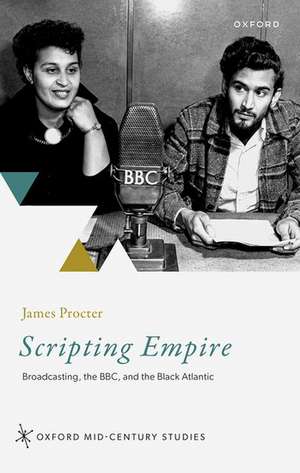Scripting Empire: Broadcasting, the BBC, and the Black Atlantic: Oxford Mid-Century Studies Series
Autor James Procteren Limba Engleză Hardback – 18 mar 2024
Preț: 485.38 lei
Preț vechi: 671.59 lei
-28% Nou
Puncte Express: 728
Preț estimativ în valută:
92.89€ • 96.62$ • 76.69£
92.89€ • 96.62$ • 76.69£
Carte disponibilă
Livrare economică 12-18 martie
Livrare express 08-14 martie pentru 115.48 lei
Preluare comenzi: 021 569.72.76
Specificații
ISBN-13: 9780198894179
ISBN-10: 0198894171
Pagini: 304
Ilustrații: 20 Illustrations
Dimensiuni: 145 x 223 x 20 mm
Greutate: 0.48 kg
Editura: OUP OXFORD
Colecția OUP Oxford
Seria Oxford Mid-Century Studies Series
Locul publicării:Oxford, United Kingdom
ISBN-10: 0198894171
Pagini: 304
Ilustrații: 20 Illustrations
Dimensiuni: 145 x 223 x 20 mm
Greutate: 0.48 kg
Editura: OUP OXFORD
Colecția OUP Oxford
Seria Oxford Mid-Century Studies Series
Locul publicării:Oxford, United Kingdom
Recenzii
In the years of decolonization, an extraordinarily talented group of Caribbean women and men engaged in a daily refashioning of empire utilizing the channels of radio. Scripting Empire, beautifully written and based on a decade of original research, addresses questions of form, genre, and technology and gives us a different lens on the BBC and the Black Atlantic.
James Procter's Scripting Empire is a perceptive and incisive exploration of a formative conjuncture in the story of mid-twentieth-century Black Atlantic modernism centered in London. Marked on one side by the centrality of broadcast radio to the infrastructures of literary production, circulation, and identity, and on the other, by the cultural-politics of decolonization, this is a conjuncture in which a generation of diasporic West Indian and West African writers navigated, challenged, appropriated, and transformed the BBC public sphere. Scripting Empire is a study of remarkable erudition.
Scripting Empire juxtaposes the work of a wide range of authors and artists in a fresh and thought-provoking fashion: Una Marson and Langston Hughes, to explore transatlantic connections; Louise Bennett and Wole Soyinka, to shed light on the use of the dramatic monologue as a literary and radio form; Amos Tutuola and Derek Walcott, to consider the impact of audio hardware on writing and broadcasting; and also considers connections among members of wider networks who used literature and radio to advance their varied agendas...Procter shows why we need to pay more attention to programmes, to what they contained and how they sounded, including how accent, dialect, and idiom were deployed on-air to create a sense of community and identity and to win over listeners.
Meticulously researched, Scripting Empire shows us how much Caribbean and West African writers contributed to the BBC's domestic and international programming and equally how much the BBC shaped midcentury global writing in English. Despite being the most extensive part of the British Empire's media infrastructure, BBC radio nevertheless became a laboratory for imagining decolonization. Consulting an astonishing range of archival materials from across the BBC's many distinct radio programmes and platforms, James Procter's work demonstrates how the literary voice of global English was forged in BBC radio studios.
Scripting Empire tunes in astutely to an unexplored frequency of broadcasting and literary history to make for essential reading for students of the BBC and the Black Atlantic.
James Procter's Scripting Empire is a perceptive and incisive exploration of a formative conjuncture in the story of mid-twentieth-century Black Atlantic modernism centered in London. Marked on one side by the centrality of broadcast radio to the infrastructures of literary production, circulation, and identity, and on the other, by the cultural-politics of decolonization, this is a conjuncture in which a generation of diasporic West Indian and West African writers navigated, challenged, appropriated, and transformed the BBC public sphere. Scripting Empire is a study of remarkable erudition.
Scripting Empire juxtaposes the work of a wide range of authors and artists in a fresh and thought-provoking fashion: Una Marson and Langston Hughes, to explore transatlantic connections; Louise Bennett and Wole Soyinka, to shed light on the use of the dramatic monologue as a literary and radio form; Amos Tutuola and Derek Walcott, to consider the impact of audio hardware on writing and broadcasting; and also considers connections among members of wider networks who used literature and radio to advance their varied agendas...Procter shows why we need to pay more attention to programmes, to what they contained and how they sounded, including how accent, dialect, and idiom were deployed on-air to create a sense of community and identity and to win over listeners.
Meticulously researched, Scripting Empire shows us how much Caribbean and West African writers contributed to the BBC's domestic and international programming and equally how much the BBC shaped midcentury global writing in English. Despite being the most extensive part of the British Empire's media infrastructure, BBC radio nevertheless became a laboratory for imagining decolonization. Consulting an astonishing range of archival materials from across the BBC's many distinct radio programmes and platforms, James Procter's work demonstrates how the literary voice of global English was forged in BBC radio studios.
Scripting Empire tunes in astutely to an unexplored frequency of broadcasting and literary history to make for essential reading for students of the BBC and the Black Atlantic.
Notă biografică
James Procter is Professor of Modern and Contemporary Literature at Newcastle University. He is the author of Dwelling Places: Postwar Black British Writing (2003), Stuart Hall (2004), co-editor of Reading Across Worlds (2015), Out of Bounds: British Black and Asian Poets (2012), and Postcolonial Audiences: Readers, Viewers and Reception (2013), as well as numerous articles and chapters in leading postcolonial journals and book collections. His current research interests are in radio literature and empire between the 1930s and late 1960s, a project for which he was awarded a Leverhulme Research Fellowship in 2013-14.














